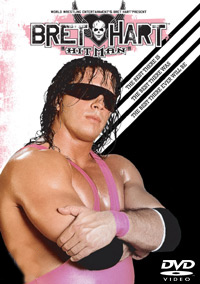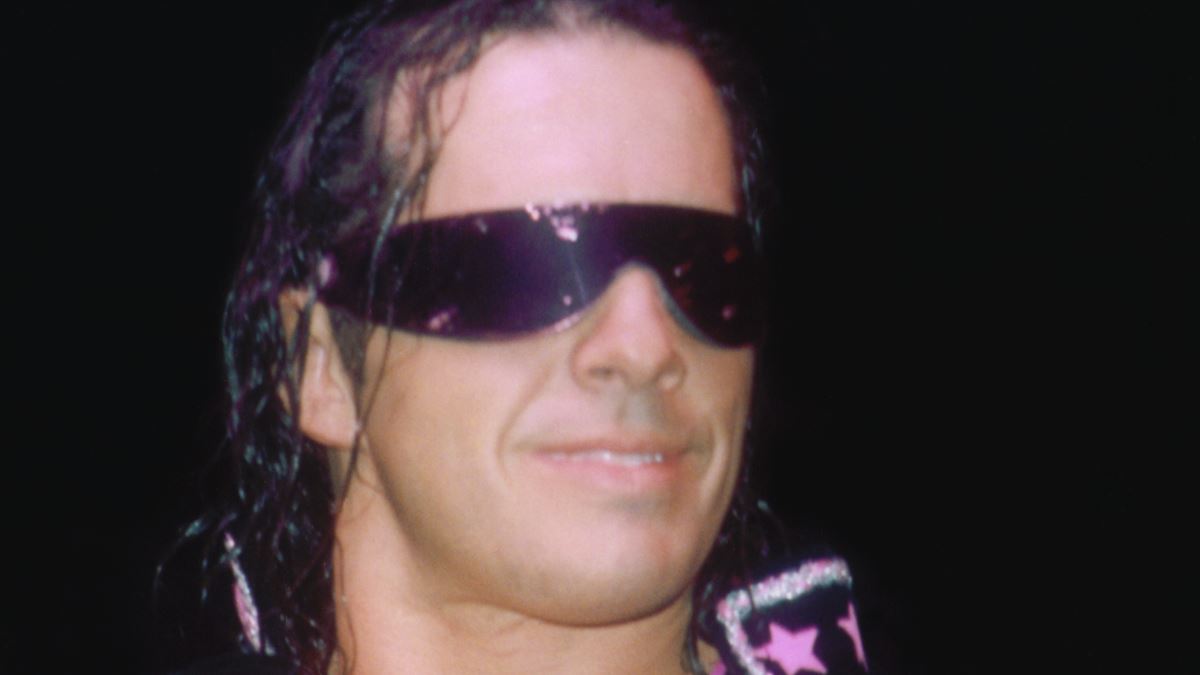Who would have thought that, after the years of friction between Bret “Hitman” Hart and Vince McMahon, the two would be able to put aside their differences and work together once more. Thankfully they did, since it resulted in the release of the new DVD set, Bret Hart: The Best There Is, The Best There Was, the Best There Ever Will Be, a great look back at the career of one of wrestling’s modern legends.

The three-disc set includes a two-hour retrospective of Bret’s wrestling career, with Hart himself providing the commentary in the form of his personal views and observations of the events of his life in the industry.
There are some excellent clips of his early Calgary Stampede Wrestling days, and very interesting for many fans who might not have seen any of that footage before. Historians will appreciate the clips from those days which include snippets from his matches against stars like Nick Bockwinkel and The Dynamite Kid. The innovation of Stampede Wrestling is also showcased, and Bret is shown participating in various types of matches, including a leather-strap-on-a-pole match, a chain match, and a ladder match.
From there, his early WWE days are documented, and he discusses how he went from enhancement talent (aka ‘Jobber’) on the singles roster to tag team superstar as a member of the Hart Foundation.
Comments from other WWE stars are solicited from this point onwards, and insights are received from Jim Ross, Jimmy Hart, and Christian, as they talk about what made the Hart Foundation such a perfect combination of talent and personality, which ultimately led to their becoming tag team champions. This was a definitely a golden era for tag team wrestling, and Hart notes that being awarded the tag team championship during this time was particularly meaningful.
From there, Bret discusses his singles career at length. Though he enjoyed his time with Neidhart, Hart was looking to show that he was the best singles wrestler as well. He narrates us through several of his classic matches, and tells stories about some of his best opponents, including “Mr. Perfect” Curt Hennig, Davey Boy Smith, Ted DiBiase, and Roddy Piper among others.
This is the lengthiest segment of the story, which is logical, since it was his singles run that lasted the longest and produced such memorable career highlights, such as his incredible performances the night he won the King of the Ring. Bret prides himself on the fact that he was able to consistently put on brilliant matches, no matter who his opponent was, unlike some of the other main event names that couldn’t match his diversity, namely Hulk Hogan and Lex Luger. And it is that quality that he believes ultimately earned him the WWE title.
Other major feuds that he covers are those with his brother Owen, “Stone Cold” Steve Austin, and naturally, Shawn Michaels. His comments about Michaels are particularly telling, and you can tell that there is still some hostility there. He also discusses his last run as the leader of the Hart stable and the phenomenon of playing a hero in some countries yet a villain in the United States — arguably the best-executed character developments in wrestling history. Bret calls this the best time of his career.
Of course, no discussion of Bret’s career can overlook the Survivor Series incident from 1997. Bret is still disappointed at the way things happened, and feels that after he gave so much to the company, he genuinely felt like he was betrayed. In the end, both he and Vince acknowledge that what happened wasn’t necessarily the right thing — but neither of them would do anything differently.
Little mention is made about Bret’s WCW run, and it’s clear that Bret was disappointed with the way he was used, or rather mis-used by the company. Instead, most of the WCW coverage is dedicated to the tribute match he and Chris Benoit put on in Owen Hart’s memory.
Bret’s career-ending injury is covered in some depth, and then he talks about his life after his retirement from the ring, including his stroke. During his recovery, Hart gained a new appreciation for his life in general. His outlook on life changed as a result, and he acknowledges that his participation in this DVD is testament to that.
Throughout the career retrospective, Hart is fairly open with his comments and sharing his feelings. On more than one occasion he visibly chokes up, particularly when recounting his memories of his father, Smith, Hennig, and Owen.
The rest of the set is composed of some of Bret’s greatest matches — and there is quite the library to choose from in that regard. Included are some tag matches, including one against the British Bulldogs from Madison Square Gardens, and one against the Killer Bees. You can clearly see Hart’s adaptability from tag team wrestling to singles matches, and his in-ring mastery is evident even early on.
What’s interesting to see is how good tag team wrestling can be — the crowds were incredibly hot for those matches (in fact, I remember when tag team matches were often the main event of a show), which is something you barely see anymore.
The singles matches featured are also brilliant showcases of his talents. One match pitting him against Ricky Steamboat from 1986 is a particular treat, as it was done right at the peak of Steamboat’s career, and right at the point where Bret’s singles career was just burgeoning. A match from three years later against “Million Dollar Man” Ted DiBiase is another good affair, and it’s during that one that the character that got fully developed into a champion shortly thereafter was present. Here is where he shows us the underdog character, as he takes a beating for much of the match — as he says on the DVD, one of the things he does well is sell a beating and make the other guy look good. What’s more is that he can do this and still keep the audience engaged for fairly lengthy matches (by today’s TV standards).
In some cases, the commentary has changed — for example, there is no commentary on the DiBiase match, and the Saturday Night’s Main Event match features only play-by-play by Vince McMahon, presumably due to restrictions from using Jesse Ventura’s voice (though a sentence or two from The Body manages to sneak through on occasion).
Other matches include many of Hart’s most famous PPV encounters, including his Intercontinental title matches against the British Bulldog and Mr. Perfect, and his WrestleMania X match against Owen. One that I really enjoyed was a match he had against Owen shortly after their SummerSlam steel cage match. I hadn’t seen it before — it aired on the “Action Zone” program — and I thought it was even better than that matchup.
Other matches featured are his In Your House encounters with Hakushi and the British Bulldog, his Survivor Series match against Diesel, and his WrestleMania 13 match against Austin where they pulled off the “double-turn”, something that has never been pulled off as well since.
The last match included is the Owen Hart tribute match from Nitro. For anyone who hasn’t seen this, it’s a fantastic technical contest. But what really makes it special is the emotional aspect of the match, taking place in the Kemper Center where Owen tragically died. Both men, you can tell, are fighting against their emotions as well as against each other during the match.
The other features in the set include some quick interviews where he discusses life in the Hart family, life on the road with the Hart Foundation, early moments in his career, and the life of a professional wrestler in general. As well, there are two tribute videos on there as well; one, for his brother Dean, who died the night before the 1990 Survivor Series, and one which is a tribute to many of his friends who have passed away, including Mr. Perfect, Brian Pillman, and Davey Boy Smith, Hawk, “Big Bossman” Ray Traylor, Elizabeth, Adrian Adonis, and others. Hart truly wears his heart on his sleeve, openly breaking down when talking about Rick Rude, whom he calls a hero.
If there are any complaints about the package, they are minimal. First, as comprehensive as it was, and the sampling provided was indeed representative of Hart’s best performances, there are many more that I would have liked to see. For example, his match against the 1-2-3 Kid from Monday Night Raw, or his Saturday Night’s Main Event match against Randy Savage. His match against Ric Flair where he won his first WWE championship was discussed during the bio portion, so it would have made sense to include it in its entirety. Or the ladder match he had with Shawn Michaels. Perhaps they will do another set in the future so that these encounters can also be remembered.
Second, even though the biography was compelling, it would have been even more robust if the thoughts of some of the other key players had been included. For example, Jim Neidhart should have had the opportunity to talk about what it was like to team with Bret. Similarly, some of the legends whose matches against Bret are included, should have been allowed to have their say — maybe have them and Bret do alternate commentary on their matches; it would have been easy to do, given that some of them, like Steamboat and DiBiase are working with the company again.
My last complaint — and maybe it was just on the copy I got — was that on the Austin match, the audio track was out of synch with the video, and the second or so delay was distracting and took away from my enjoyment of the match. If this is a technical glitch on my copy only, that’s bad; if it’s on every copy, then this is just inexcusable for WWE to have let that slip.
Those minor issues aside, overall, the set is a must-have for any wrestling fan. Bret Hart truly was one of the greatest performers of all time, and Bret Hart: The Best There Is, The Best There Was, The Best There Ever Will Be is a comprehensive and respectful look back at his legacy.
RELATED LINK
